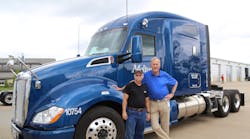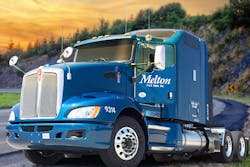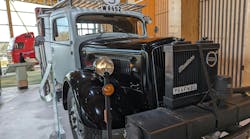In the never-ending quest to gain more fuel economy, auxiliary power units or “APUs” are becoming a key efficiency enhancer for fleets.
But can they help improve driver retention and reduce turnover?
For while there’s no question that engine idling has a measurable impact on a fleet’s operating costs – by some accounts, every hour of idle time can decrease fuel efficiency by 1% – that same engine is what keeps a truck’s sleeper berth warm or cool as needed for an off-duty driver, along with “hotel power” for operating onboard TVs and refrigerators.
Industry studies conclude that APUs that provides heat, cooling and electricity can use an estimated 0.1 to 0.3 gals. per hour compared to 1 gal. or more per hour for an idling truck engine.
But APUs are not cheap, nor light. They can typically weigh between 300 and 600 lbs. and with installation included (which can take anywhere from 5 to 24 hours) can cost anywhere from $8,500 to $13,000 per unit, according to the North American Council for Freight Efficiency (NACFE).
Of course, to just such costs, fleets need a solid return on investment (ROI) from APUs, especially in terms of fuel savings and reduced engine wear. But can further savings be realized with APUs – albeit indirectly – via help with driver retention/turnover issues?
Fleet Owner posed that and other related questions to Bob Peterson, chairman and CEO of Melton Truck Lines, as well as to Steve DeLarosby, product manager of APUs and heaters at Thermo King.
Melton installs Thermo King’s TriPac Evolution APUs on all of its 1,225 tractors and has been a Thermo King customer since 2007.
Here are their thoughts:
Talk about whether “comfort” is important to drivers on the road away from home. When you discuss the topic of “comfort on the road” with your drivers, what are their top concerns? Interior temperature when bunking down for the night? The ability to cook their own meals in the cab? Satellite TV? What exactly?
Bob Peterson: We decided to add APUs into the fleet for fuel economy as well as to provide the creature comforts that make driver lives more enjoyable on the road. They not only allowed drivers to eat healthier, powering microwaves, refrigerators, freezers and toaster ovens to reduce restaurant dining, but has also contributed to drivers’ financial health as Melton links bonuses to saved fuel mileage.
We want our drivers to be as comfortable in their truck as they are at home with power for coffee pots, crock pots, TVs, satellites, in-cab heat, and more. Drivers sleep better and are more comfortable, which in turn, reduces fatigue and increases job satisfaction.
Steve DeLarosby: We’ve found that a top priority for drivers is achieving comfortable sleeping temperatures for quality rest. An APU offers drivers the ability to maintain their ideal sleeping temperature for quality sleep which is important for safe driving and their overall wellbeing. Additional health benefits of an APU are achieved when drivers have the ability to cook their own meals which allows him/her to make healthier eating choices. The power to enjoy the creature comforts of home such as satellite TV, computers, and gaming systems cannot be underestimated.
Powering those accessories is key to creating an environment where the driver feels at home and relaxed in his tractor where so much time away from their true home is spent.
Bob Peterson: Not idling the big [truck] engine decreases noise tremendously, and that helps drivers sleep better at night. We know that rested drivers are safer drivers. APUs also allowsdrivers with sleep apnea to run CPAP [continuous positive airway pressure] machines, which assists with better quality sleep. In addition, we have an automatic restriction on idling that ensures our APUs kick in after 10 minutes.
This guarantees that we are compliant with anti-idling and noise restrictions that exist in various locations, as well as improves fuel efficiency.
Steve DeLarosby: The overall noise of an APU is considerably less than that of a tractor engine [but] an APU also eliminates vibrations throughout the tractor as its engine starts and stops. And starting and stopping [an] APU without disrupting the driver’s sleep, enabling him/her to get a continuous night of quality rest, reduces fatigue and improves overall safety on the road the next day.
Of course, an APU must pay for itself. How do APUs it reduce engine wear and tear as well as fuel consumption?
Bob Peterson: Before we added APUs to our fleet, we recorded 30% to 35% [engine] idle time. Now, with APUs, it’s down to between 8% and 10%. Even with fuel costs being down, our ROI is still under our four-year trade cycle and the APU enhances our tractor re-sale values due to the reduced engine hours logged.
Steve DeLarosby: What many may not realize is that as the tractor’s DPF [diesel particulate filter] accumulates hours [of use] and approaches the need for servicing, fuel economy declines. While tractor engines are designed to be worked hard, when idling for driver comfort the engine runs much less efficiently thereby clogging the DPF up much faster. Therefore, by eliminating idling thru the use of an APU, it prolongs the service requirements for the DPF and helps the tractor maintain its fuel efficiency.
How does a fleet calculate the point when an APU will achieve worthwhile ROI? For example: if a truck logs 80,000 miles or more per year, is adding an APU worth it? What goes into the ROI calculation for an APU anyway?
Bob Peterson: We initially invested in the APUs to save on high fuel prices. Now that [the price of] diesel is down, the APU ROI now stretches out closer to our truck life cycle. However, the gains we see in driver satisfaction have made this a healthy investment for our fleet.Steve DeLarosby: We’ve developed a very comprehensive payback/ROI calculator which takes into consideration fuel prices, miles driven, nights spent in the tractor, APU maintenance, tractor maintenance, residual values, impact on driver recruiting/retention, and several other factors. Each fleet has their own standards at what is required for an acceptable ROI, but in general, even at today’s lower fuel pricing we’re confident our APUs deliver a payback well under 24 months.
What is needed to make an APU last and deliver good service? What maintenance does one typically require and how long a fleet can expect APUs to last?
Bob Peterson: Our APUs run about 2,500 to 3,000 hours per year. They are run hard and are exposed to harsh environments. The relationship with our local APU dealer has been key. All installations are done on-site by a dealer technician, and they understand how a trucking company operates with time sensitivity being paramount. They treat us right and keep us on the road.
Steve DeLarosby: Routine maintenance such as oil and filter changes, periodic checking of electrical connections, and periodic running of their [in-cab] heater during non-heater season is all that is required to keep our APU reliable and performing optimally.
Our TriPac APUs have also been designed to require a minimum amount of preventative maintenance, at a 2,000 hour interval, so it essentially only requires maintenance once per year. The system has been engineered with a design-life of 7 years, but customers commonly run their units even longer.
Finally, what has been the reaction from drivers to having APUs on board? How has it helped with recruiting and retention?
Bob Peterson: Driver satisfaction is our number one priority, and we’ve heard loud and clear that our drivers love – and expect– having the creature comforts APUs provide. We conducted a driver satisfaction survey earlier this year and learned that APUs are one of the top five reasons drivers come and stay at Melton. We were surprised at how important this amenity has become to drivers and how critical it is to driver satisfaction and retention.
We know that fuel prices will rise again, so those savings will return, but for now, the greatest benefits with our APUs are realized with driver recruitment, retention and satisfaction.
Steve DeLarosby: Not only do APUs help provide the comforts of home and quality rest that drivers need while on the road, they also contribute to increasing tractor reliability and decreasing downtime for maintenance. Together, this keeps drivers on the road earning their income.






